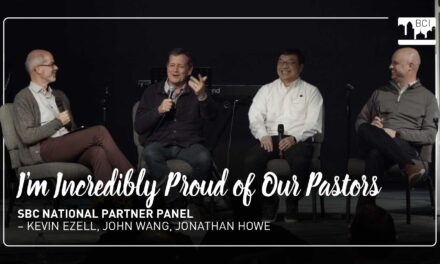By David Platt
 IMB exists to partner with churches to empower limitless missionary teams who are making disciples and multiplying churches among unreached peoples and places for the glory of God.
IMB exists to partner with churches to empower limitless missionary teams who are making disciples and multiplying churches among unreached peoples and places for the glory of God.
In order to see “limitless” missionaries working among the unreached, IMB is exploring multiple pathways through which more men and women from Southern Baptist churches might serve overseas. When you hear pathways, think possibilities—all the possible ways that ordinary Christians might serve overseas: as church planters, doctors, teachers, accountants, lawyers, fitness instructors, rickshaw drivers, retirees, students, and the list goes on and on. God has providentially arranged a multiplicity of avenues through which His people can take the gospel around the world, and as the IMB, we want to help Southern Baptists go through as many of those pathways as possible.
Up until this point, IMB has had a certain number of pathways for career, apprentice, Journeyman, International Service Corps and Masters program missionaries. In addition to separate policies for each of these pathways, IMB has had additional policy regulations covering issues like level of education, history of divorce, teenage children in the home, the practice of tongues and/or a private prayer language and circumstances surrounding baptism. Each of these policies was put in place at various times for good reasons.
However, as we look toward the future and the limitless number of missionaries we want to mobilize from Southern Baptist churches, we know that this will likely involve many new pathways through which men and women might serve on missionary teams through the IMB. Each of these pathways may carry unique qualifications, involve various types of training and include different levels of support from IMB. For example, a lead church planter in the remote deserts of the Middle East may require different qualifications, training and support than an Information Technology expert in London, a student in Shanghai, a business professional in Dubai or a retiree in Bangkok. Nevertheless, all of them may be IMB missionaries, and thus all of them need to meet a base level of qualifications. In light of this, we have seen a foundational need for a simple, clear statement of qualifications that not only unifies all IMB missionaries together, but also unifies IMB with the churches and entities of the SBC.
For this reason, trustees voted this week to approve a policy that creates a single, unitary statement of qualifications that will characterize every missionary serving through any pathway created by IMB. Further, this single policy now replaces all of the other policies mentioned above that address specific qualifications for different pathways. In order to be as clear as possible, I have pasted the new policy here, and then I want to explain it further below. The policy states:
An IMB missionary is a disciple of Jesus set apart by the Holy Spirit, sent out from the church, and affirmed by the IMB to cross geographic, cultural, and/or linguistic barriers as part of a missionary team focused on making disciples and multiplying churches among unreached peoples and places. IMB exists to empower limitless teams of missionaries made up of different men, women, and families with distinct roles and responsibilities. IMB provides multiple pathways in which missionaries may serve on one of these teams, each of which carries unique qualifications. However, any IMB missionary serving through any pathway created by IMB leadership is required to meet the following qualifications:
SPIRITUAL QUALIFICATIONS
Vibrant personal discipleship: As they abide in God’s Word and walk in step with God’s Spirit, IMB missionaries bear fruit of an intimate, growing relationship with Christ.
Evident personal disciple-making: IMB missionaries are meaningfully involved in a local church in which they participate in leading people to faith in Christ, seeing new believers baptized in the church, and showing believers how to obey Christ, all with a view toward reaching the nations with the gospel.
Call: The call to serve as an IMB missionary has been discerned within a local church and affirmed by that local church alongside IMB leadership.
Commitment: IMB missionaries are devoted to the vision, mission, values, and beliefs of the IMB.
SOUTHERN BAPTIST IDENTITY
Currently a baptized member of a Southern Baptist church
Commitment to and identification with Southern Baptists
Conviction of truth as expressed in the current Baptist Faith and Message statement of the Southern Baptist Convention
HEALTH
Good physical, emotional, and mental health.
FAMILY
IMB missionaries model a godly family life and/or personal relationships.
CITIZENSHIP
Service is open to U.S. citizens and permanent residents of the United States.
A few comments and clarifications regarding what this policy does and does not mean are extremely important.
First, this policy means that when it comes to specific IMB pathways for service like career, apprentice, Journeyman, International Service Corps, or Masters, IMB no longer has official policies detailing additional qualifications for each of these pathways. Nevertheless, this policy does not mean that just anyone can now serve through any of these pathways created by IMB. We will still have clear expectations and qualifications, which accompany every pathway created by IMB (whether the ones mentioned above or new pathways we create in the days ahead). This policy simply allows IMB leadership the opportunity to evaluate and revise the expectations and qualifications for those pathways in order to continually strengthen them in the days ahead.
Second, this policy does not mean that current principles governing the selection of missionaries may not apply to particular pathways in the future. For example, we have had a policy prohibiting missionaries with teenage children from being selected for certain pathways. This policy was established for good reason in light of challenges for children (and their families) moving overseas at certain ages. As a result, there may be some pathways through which IMB continues to not appoint missionaries with teenage children. At the same time, this new policy does leave open the possibility for IMB pathways to exist in which missionaries with teenage children might serve through IMB. Certainly we will approach a family with older teenage children who is considering moving their lives permanently to a remote area in sub-Saharan Africa differently than a family with younger teenage children who is considering moving their lives for a one-year assignment in London.
Third, this policy does not signal a change in practice regarding how the IMB works in relation to Southern Baptist doctrine and practice. The purpose of this policy is actually to ensure that every potential IMB missionary is a meaningful member of a Southern Baptist Church and believes and works according to the current Baptist Faith and Message. This policy asserts that this statement of faith, which unites over 40,000 churches in the Southern Baptist Convention, is sufficient for us. Moreover, this policy states that the Baptist Faith and Message is significant for us in the sense that we will hold missionaries to it, not only in what they believe but in how they live and work as IMB missionaries. In sum, this policy states that every meaningful member of a Southern Baptist church who has been baptized (by immersion) as a follower of Christ, whose belief and practice both align with the Baptist Faith and Message, and who meet all of the spiritual qualifications mentioned above may potentially serve as an IMB missionary.
Fourth, simply because we replace other policies addressing more specific doctrinal distinctives beyond the Baptist Faith and Message does not mean that such distinctives are now unimportant to IMB. For example, replacing the policy that addresses tongues and private prayer language does not mean that the issue of tongues is unimportant to IMB work around the world. We will continue to train and work as missionaries in ways that faithfully represent Southern Baptist churches and conviction, and we will continue to have as part of our “Manual for Field Personnel” allowance for termination of employment for any missionary who places “persistent emphasis on any specific gift of the Spirit as normative for all or to the extent such emphasis becomes disruptive” to Southern Baptist missions work. In a similar way, replacing the policy that addresses believer’s baptism does not in any way mean that IMB will in any sense dilute the way we select, train and work as missionaries in complete accord with the statement on baptism in the Baptist Faith and Message.
Fifth, this policy does not mean we are lowering the standards for missionaries. Indeed, quite the opposite is true. Some may see the replacement of policies dealing with divorce or tongues, for example, as efforts to “lower the bar” regarding expectations of missionaries. One might imagine a man or woman with multiple divorces who is also engaged in harmful charismatic practices and wonder if this policy revision now opens the possibility for that person to serve as an IMB missionary. But this is most definitely not what this policy means. As you see in the new policy, the baseline qualification for missionaries includes men and women who “bear fruit of an intimate, growing relationship with Christ” and are “meaningfully involved in a [Southern Baptist] church in which they participate in leading people to faith in Christ, seeing new believers baptized in the church and showing believers how to obey Christ, all with a view toward reaching nations with the gospel.” Further, prospective missionaries must evidence a missionary call that is both “discerned within their local church and affirmed by that local church alongside IMB leadership.” Finally, they must be “devoted to the vision, mission, values, and beliefs of the IMB.” We hope that if all of these characteristics are evident in a member of a Southern Baptist church, and that church affirms with us God’s call for that member to work as a missionary, then pathways for service as an IMB missionary may be a possibility (whether as a church planter or support worker who receives full financial support from the IMB, as a business professional who receives no financial support from the IMB or anywhere in between).
In conclusion, what this policy means is that IMB wants to open wide the door for Southern Baptist churches to send thousands upon thousands of biblically qualified members in the days ahead to serve as IMB missionary team members who are making disciples and multiplying churches among the unreached. These members will serve in many different positions with many different responsibilities, ranging from lead church planters to vital support roles, from business professionals to college students to active retirees. From a variety of different backgrounds with a variety of different skills and a variety of different qualifications, they will join together to spread the gospel to people who have never heard it. The ultimate aim of this policy revision is to enable limitless God-exalting, Christ-following, Spirit-led, biblically-faithful, people-loving, high-quality Southern Baptist missionaries to serve with IMB through a multiplicity of pathways in the days ahead.
David Platt is president of the International Mission Board of the Southern Baptist Convention.








